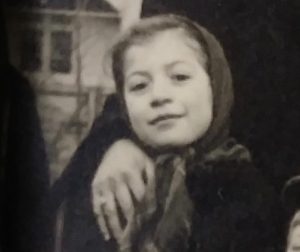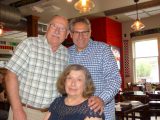- Local Survivor registry
- POLA GLINCMAN
- Local Survivor registry
- POLA GLINCMAN
Survivor Profile

POLA
GLINCMAN
(1941 - PRESENT)
PRE-WAR NAME:
POLA GLINCMAN
POLA GLINCMAN
PLACE OF BIRTH:
LABOR CAMP, SIBERIA
LABOR CAMP, SIBERIA
DATE OF BIRTH:
DECEMBER 14, 1941
DECEMBER 14, 1941
LOCATION(s) DURING THE WAR:
LABOR CAMP, SIBERIA; SOVIET CONTROLLED POLAND
LABOR CAMP, SIBERIA; SOVIET CONTROLLED POLAND
STATUS:
CHILD SURVIVOR
CHILD SURVIVOR
RELATED PERSON(S):
JOZEF GLINCMAN - Father (Deceased),
LUBA GLINCMAN - Mother (Deceased),
MANDEL GLINCMAN, brother ,
BRUCE GLINCMAN, brother ,
ADAM GLINCMAN, nephew ,
JOSHUA GLINCMAN, nephew ,
MICHAEL GLINCMAN, nephew
-
BIOGRAPHY BY NANCY GORRELL
Pola was born during the war in a labor camp to Luba and Jozef Glincman somewhere in Siberia. Her parents were both born in the same shtetl,Wlodawa, in Poland. Pola’s maternal grandfather was butcher. According to Pola in her interview, her mother had a wonderful life there in the pre-war period. Her mother’s family were middle class; they were religious. Her father used to go to synagogue, and he used to bring a poor person to the shabbos meal every shabbat. Her mother was always going out in groups at night. There was a lively social life. She had a good life. They weren’t rich. Her mother never spoke about experiencing anti-Semitism before the war. She went to public school with Jews and non-Jews. After the Nazi invasion of September 1939, those who could were escaping Poland. Her mother’s father wouldn’t let her go unmarried. Her mother was going out with her father at the time. So she got married and escaped with him and survived the war. Her father decided to stay along with her grandmother, great grandmother and aunt and uncle. The only ones that survived on her mother’s side of the family were her mother and her sister. On her father’s side of the family, and the only ones who survived were my father and his younger sister out of a family of four.
Pola’s parents were captured by the Russians and sent to a labor camp in Siberia where Pola was born on December 19, 1941. Her brother, Manny was born in Russian controlled Poland in 1944. The family went to the American zone in Berlin before they emigrated from Germany to the United States. Pola does not remember who sponsored them, but she does know that HIAS was responsible for helping them settle in Brooklyn, New York. They stayed in an apartment there for a while, and then they went to New Jersey where her father bought a chicken farm in Jackson Township. Pola grew up in Jackson. She describes her childhood there as a “quiet, normal childhood. We went to school; we had friends; we played. My parents never talked about the past. They never really dwelled on it. They told us stories when I asked. Everyday life consumed them.” Her mother in her later years started to talk a little, but in Pola’s growing up years, she didn’t know too much. Her youngest brother, Bruce, was born in the Jackson in 1954. Pola now (2017) resides in New York City.
-
SURVIVOR INTERVIEW:
POLA GLINCMAN INTERVIEW
Date: October 30, 2017
Location: Glincman Residence, Phone Conference
Interviewer: Nancy Gorrell
Q: Describe your family background:
My mother, Luba and father, Jozef were both born in Wlodawa, Poland, a shtetl. My grandfather (maternal) was a butcher. My father’s father I’m not sure. I think he was worked with medals. My parents never talked much about the past, but later on my mother did.Q: What did she tell you about her past life before the war?
She had a wonderful life there. They were middle class; they were religious. Her father used to go to synagogue, and he used to bring a poor person home to the shabbos meal every shabbat. My mother was always going out in groups. There was a lot of dancing at night. It was a very social thing. She had a good life. It wasn’t rich. She never dreamt of going to the United States until the war broke out.Q: Did she ever talk about experiencing anti-Semitism before the war?
No. She went to public school with Jews and non-Jews. She really didn’t talk about any prejudice.Q: What happened when the war broke out?
When the broke out, she got married. It sounds strange, but I always say that. Many people were running away, escaping. Her father wouldn’t let her go unmarried. She was going out at the time with my father. So she got married, and she escaped with my father.Q: What did the rest of her family do family?
Her father decided stay because he thought he was too old, and nothing would happen to him. He said he fought one war, and this one couldn’t be worse than the first one, so he’s going to stay. My grandmother, my great grandmother, and my aunt and uncle stayed too.Q: What family members escaped?
The ones that escaped were my mother, her older sister with their husbands and two of their brothers. The only ones that survived on my mother’s side were my mother and her sister.Q: Who survived on your father’s side?
Out of a family of four on my father’s side, the only one who survived was my father and his younger sister. What happened was they were captured by the Russians and went to a labor camp.Q: Who perished after the invasion?
Right after the invasion, my great grandmother was shot in her bed. They came for her and she refused to go. My grandmother saw her two children shot at this time when they came to tell her the Nazis were coming. After that, she gave up. I’m not sure what happened to her, but I just heard she “gave up.” My grandfather on my mother’s side, he was captured and taken to a camp (I’m not sure of the name), they were building at the time. He died there.Q: What happened to your parents?
I was born in 1942 in the labor camp. My brother, Manny was born in Russian controlled Poland in 1944. My mother had food for him at that time. We went to the American zone in Berlin before we emigrated from there to the United States. I remember the trip a little bit. It was an illegal trip. It cost money. I don’t know how my parents did it. I know one time they tried, and they were captured, and then the second they made it to Berlin. My brother and I were on the trip.Q: Do you have memories of coming to America?
Yes. I have memories of coming to America. I remember the boat. We went to Brooklyn. HIAS helped us find an apartment. We stayed in an apartment for a while. And then we went to New Jersey, and my father bought a chicken farm in Jackson Township. I grew up in Jackson.Q: Do you know the person or relative that sponsored you?
No. But I know you had to have one. HIAS helped settle us.Q: What was post-war life like in Jackson, New Jersey for you?
We had a quiet, normal childhood. We went to school; we had friends; we played. My parents never talked about the past. They never really dwelled on it. They told us stories when I asked. Everyday life consumed them. My mother in her later years started to talk a little, but in our growing up years we didn’t know too much. Our youngest brother, Bruce, was born in the Jackson in 1954. I live now in New York City. -
Sources and Credits:
Credits:
SSBJCC Phone Interview October 30, 2017, Interviewer: Nancy Gorrell; Biography by Nancy Gorrell; Digital historic and family photographs donated by Mandel and Linda Glincman.




